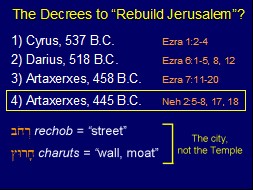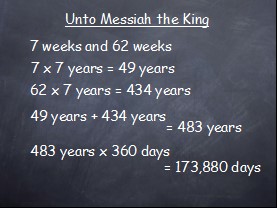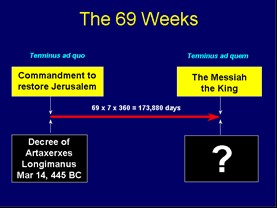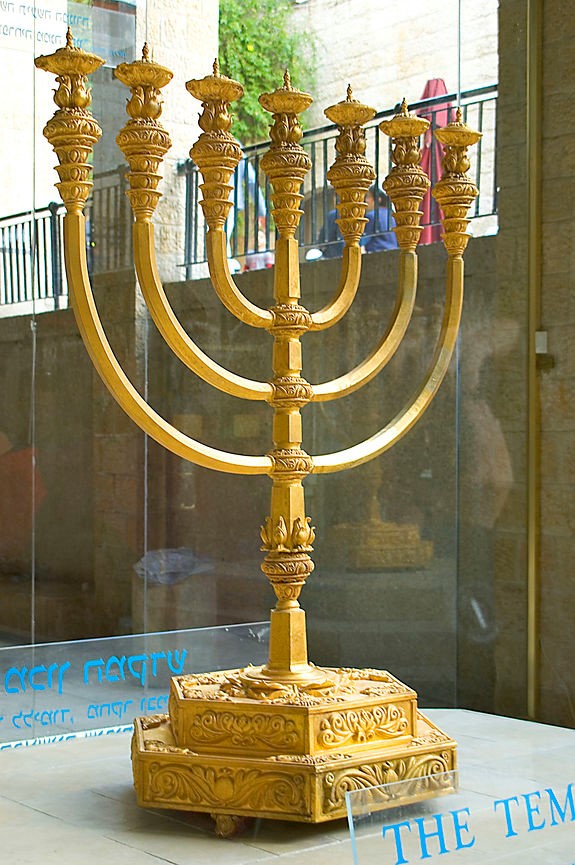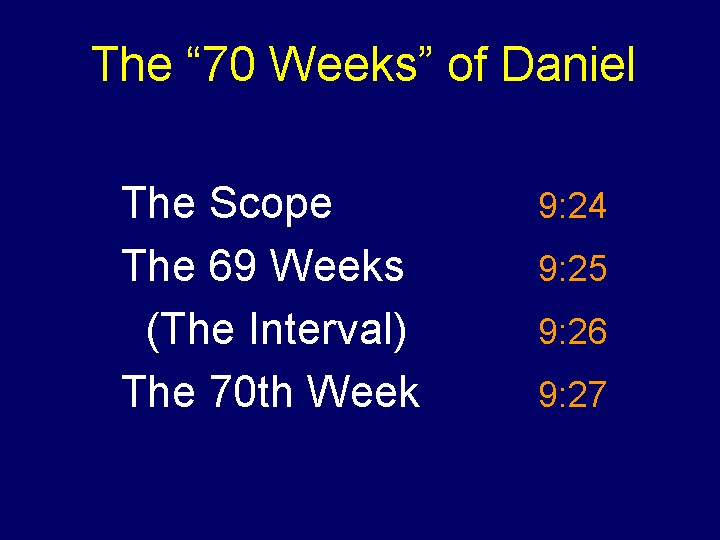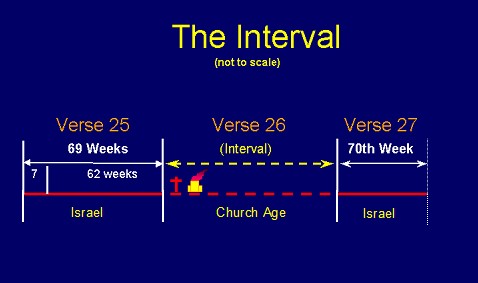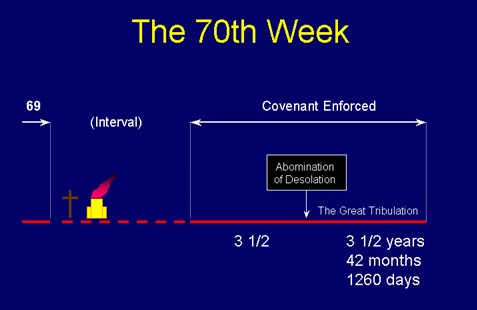This study of Daniel chapter 9 vs 24-26, also known as ‘Daniel’s 70 Weeks’ was given by Pastor Barry Forder at Calvary Portsmouth on 27th June 2021.
As we noted in the last session, Daniel chapter 9 is, without doubt, one of the most important chapters in the Bible. Now, that is an audacious statement, but this chapter contains one of the most remarkable prophecies in the Bible that provides irrefutable evidence that Jesus Christ is the Messiah. On its own that sets it apart, but it also lays out God’s plan for the nation of Israel from the time of the Babylonian captivity unto the Second Coming of Jesus. It give us important prophetic details of the events on our near horizon, when a world leader, who will emerge from within the nations that made up the old Roman Empire, will step onto the world scene and become famous for doing what presidents and kings have unsuccessfully tried to accomplish, bringing peace in the middle east! It is also a chapter the confirms, once again, what we have already seen in the book of Daniel a number of times, that it is God who rules in the kingdoms of man, and He will ultimately give control of the whole earth to His Son, Jesus Christ!
The 70 Weeks Prophecy
As we now look at the prophecy that Gabriel gives to Daniel, we find that it is broken down into four sections:
Firstly, verse 24 gives us the whole scope of the prophecy; it tells us to whom the prophecy referrers and what is to be accomplished during the time of the prophecy.
Verse 25 gives us the first section of the prophecy, namely the 69 weeks.
We then find an interval between the 69 weeks and the 70th week that is dealt with in verse 26.
Finally, verse 27 explains the starting point for, and some specific details of the 70th week.
Daniel 9:24 – The Scope of the Prophecy
Seventy weeks are determined upon thy people and upon thy holy city, to finish the transgression, and to make an end of sins, and to make reconciliation for iniquity, and to bring in everlasting righteousness, and to seal up the vision and prophecy, and to anoint the most Holy.
Seventy weeks
The first thing we need to understand is the term, translated in our Bible’s as, ‘seventy weeks’. In the Hebrew, the word for ‘weeks’ used here is ‘shabuwa’ (shaw-boo’-ah), which means ‘a week of years’. So what we have is ‘seventy weeks o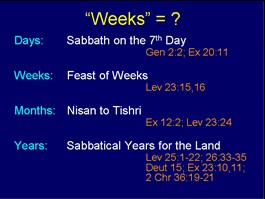 f years’. Whilst this may seem strange to us it was not unusual to the Jews, who not only had a week of days, but also a week of weeks, a week of months and, as is the case here, a week of years. Various examples of these ‘weeks’ can be found in the Bible: We are all familiar with a week of days, as outlined in Genesis 2:2 / Exodus 20:11. We find reference to a week of weeks (i.e. seven weeks) in Leviticus 23. From the Feast of Firstfruits, the Jews were told to count forward seven weeks (7 x 7 = 49 days), after which, the next day was to be the Feast of Weeks (also known as Pentecost – ‘pent’ meaning 50 as it was 50 days from the Feast of Firstfruits). The same idea applied to the Mosaic feasts which were all to occur in a week of months (i.e. a 7 month period). Finally we have the week of years (seven years = one ‘shabuwa’). This can be seen in various places in the Old Testament such as Leviticus 25 where God told the Jews that they were to work the land for six years, but in the seventh year they were to let the land rest. This was to be a Sabbath for the land. It was precisely because Israel failed to observe this law that God then told them in effect ‘you owe me 70 years’, and thus we have the 70 years in
f years’. Whilst this may seem strange to us it was not unusual to the Jews, who not only had a week of days, but also a week of weeks, a week of months and, as is the case here, a week of years. Various examples of these ‘weeks’ can be found in the Bible: We are all familiar with a week of days, as outlined in Genesis 2:2 / Exodus 20:11. We find reference to a week of weeks (i.e. seven weeks) in Leviticus 23. From the Feast of Firstfruits, the Jews were told to count forward seven weeks (7 x 7 = 49 days), after which, the next day was to be the Feast of Weeks (also known as Pentecost – ‘pent’ meaning 50 as it was 50 days from the Feast of Firstfruits). The same idea applied to the Mosaic feasts which were all to occur in a week of months (i.e. a 7 month period). Finally we have the week of years (seven years = one ‘shabuwa’). This can be seen in various places in the Old Testament such as Leviticus 25 where God told the Jews that they were to work the land for six years, but in the seventh year they were to let the land rest. This was to be a Sabbath for the land. It was precisely because Israel failed to observe this law that God then told them in effect ‘you owe me 70 years’, and thus we have the 70 years in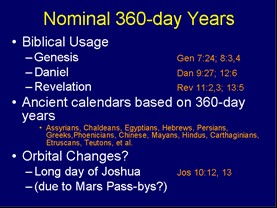 Babylon so that, as 2 Chron 36:19-21 explains, the land could enjoy her Sabbaths. In Genesis 29:27 we read that Jacob served for a ‘week’ for Rachel, which we are told was seven years. So returning to our text, the duration of this prophecy was to last for seventy seven-year periods, which is 490 years.
Babylon so that, as 2 Chron 36:19-21 explains, the land could enjoy her Sabbaths. In Genesis 29:27 we read that Jacob served for a ‘week’ for Rachel, which we are told was seven years. So returning to our text, the duration of this prophecy was to last for seventy seven-year periods, which is 490 years.
Another important thing to understand is that, when dealing with prophetic years in the Bible, they are always reckoned to be 360 days in length. There is compelling evidence to suggest that the earth used to be on a 360-day orbit of the Sun (we are currently on a 3651/4 day orbit). All the ancient calendars seem to have been based on a 360-day year that, for some reason, changed in 701 B.C. What caused this change is a matter of scholastic debate, however one of the most credible theories revolves (if you pardon the pun) around the planet Mars.
Mars has long been associated with war (we still use the term ‘marital arts’). For some unknown reason the ancient cultures seemed to be terrified of Mars, yet today very few of us could pick it out at nigh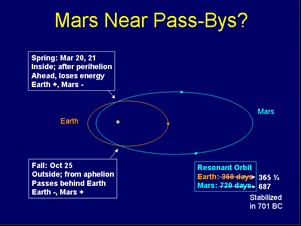 t if we look up in the sky. There are also records of ‘freak’ natural disasters that seemed to occur at regular 104-year intervals. It has been observed that many of the unusual Biblical events recorded in the Old Testament coincided with these dates, including the flood of Noah, the long day of Joshua, Hezekiah’s sundial etc. It has been conjectured that Earth and Mars used to be on resonant orbits, Earth being 360 days and Mars being twice that at 720 days. If this is correct, then at two points in the year, March 20/21 and October 25th, Mars and the Earth would pass by far closer than they do today causing massive tidal waves and earthquakes etc. Such an event would strike fear into those living at that time and would easily explain the paranoia. For those wanting to explore this in more detail, see Chuck Missler’s ‘Signs in the Heavens’ or commentary on Joshua – available from K-House: www.khouse.org
t if we look up in the sky. There are also records of ‘freak’ natural disasters that seemed to occur at regular 104-year intervals. It has been observed that many of the unusual Biblical events recorded in the Old Testament coincided with these dates, including the flood of Noah, the long day of Joshua, Hezekiah’s sundial etc. It has been conjectured that Earth and Mars used to be on resonant orbits, Earth being 360 days and Mars being twice that at 720 days. If this is correct, then at two points in the year, March 20/21 and October 25th, Mars and the Earth would pass by far closer than they do today causing massive tidal waves and earthquakes etc. Such an event would strike fear into those living at that time and would easily explain the paranoia. For those wanting to explore this in more detail, see Chuck Missler’s ‘Signs in the Heavens’ or commentary on Joshua – available from K-House: www.khouse.org
In regard to the 360-day year, Sir Isaac Newton said the following:
“…all nations, before the just length of the solar year was known, reckoned months by the course of the moon, and years by the return of winter and summer, spring and autumn; and in making calendars for their festivals, they reckoned thirty days to a lunar month, and twelve lunar months to a year, taking the nearest round numbers, whence came the division of the ecliptic into 360 degrees.”
In other words, the reason that we have 360 degrees in a circle, is because of this 360-day year that the ancient cultures worked to.
Seventy weeks…. are determined upon thy people and upon thy holy city
Now we are told to whom the prophecy refers: the Jews and Jerusalem. As we have seen throughout this chapter, Daniel has been praying for his people and Jerusalem, therefore it comes as no surprise that Gabriel now gives him a prophecy concerning the same.
….to finish the transgression, and to make an end of sins, and to make reconciliation for iniquity, and to bring in everlasting righteousness, and to seal up the vision and prophecy, and to anoint the most Holy.
Here we are told what will be accomplished by the end of the 490 prophetic years. Whilst it could be said that ‘reconciliation for iniquity’ was accomplished by Jesus on the cross, the other criteria have certainly not been met yet; for we have not witnessed and end of sins, or the ushering in of everlasting righteousness; nor have we seen all prophecies fulfilled or the anointing of the most Holy [place] – which in this context’s referrers to the Sanctuary in the Jewish Temple.
Therefore we have just two options: either this prophecy did not come true (unlikely!), or, the seventy weeks are not continuous and part of the prophecy is yet to be fulfilled.
As we will see clearly in a moment, it is the latter.
Daniel 9:25 – The 69 Weeks unto Messiah
Know therefore and understand, that from the going forth of the commandment to restore and to build Jerusalem unto the Messiah the Prince shall be seven weeks, and threescore and two weeks: the street shall be built again, and the wall, even in troublous times.
Know therefore and understand…
Once again Gabriel tells Daniel ‘listen up ‘cos this is important!’ – see notes on v22.
…from the going forth of the commandment to restore and to build Jerusalem…
Now we are given the starting point for the 490 years – the ‘commandment to restore and to build Jerusalem’. There were actually four commands given pertaining to the Jews (see slide), however only one of these – the decree by Artaxerxes Longimanus in 445 B.C. – was regarding the rebuilding of the city. All the other decrees were specifically in regard to the Temple only.
Thanks to the work of Sir Robert Anderson, who published his book ‘ The Coming Prince’ back in 1885, and who confirmed his findings with the Royal Greenwich Observatory, we know that the decree was signed on the 14th March 445 B.C. This is recorded in Nehemiah chapter 2 when Nehemiah, the king’s cupbearer, went before the king and was granted his request to return and rebuild the city of Jerusalem.
…unto the Messiah the Prince
Having been given the beginning, Daniel is now told what will bring this first period to an end, namely the arrival of the Messiah! NB: The word translated ‘Prince’ is the Hebrew word ‘nagiyd’ which means ‘chief ruler’, i.e. king.
..shall be seven weeks, and threescore and two weeks…
Therefore, from the command of Artaxerxes unto the Messiah there is to be seven weeks of years (49 years), followed by sixty-two weeks of years (434 years), making a total of 483 years. As we have mentioned, these years are each 360 days in length, thus it is possible for us to calculate the exact number of days that Gabriel says will expire between the command being given and Messiah the King. (See calculation below)
….the street shall be built again, and the wall, even in troublous times.
Gabriel states that during this time Jerusalem will be rebuilt, although it will be during troubled times; this is itself confirmed in the book of Nehemiah.
The question we should now ask is: Did anything of significance occur after 173,880 days had been completed?
In order to answer that question we need to turn our attention to a strange phenomenon that occurred throughout Jesus’ ministry, one that it is easy to miss by casually reading the gospels; however once it is noticed it is perplexing indeed. It stars at the wedding in Cana as recorded in John’s gospel: “And the third day there was a marriage in Cana of Galilee; and the mother of Jesus was there: And both Jesus was called, and his disciples, to the marriage. And when they wanted wine, the mother of Jesus saith unto him, They have no wine. Jesus saith unto her, Woman, what have I to do with thee? mine hour is not yet come.” (John 2:1-4) Surely this would have been a great way to announce that He was the Messiah, at such a public gathering? Yet it was only His disciples who were aware of what had happened. And what did Jesus mean by ‘mine hour is not yet come’?
As we read on in John’s gospel we come to the feeding of the five thousand (chapter 6). Surely this would be the time, in front of so many, to declare Himself the Messiah? However we read: “Then those men, when they had seen the miracle that Jesus did, said, This is of a truth that prophet that should come into the world. When Jesus therefore perceived that they would come and take him by force, to make him a king, he departed again into a mountain himself alone.” (John 6:14-15)
A short while after this, at the time of the Feast of Tabernacles when all Jewish males were required by the Law of Moses to go up to Jerusalem, His disciples asked Him if He was going up with them; He replied: “ My time is not yet come: but your time is aIways ready. The world cannot hate you; but me it hateth, because I testify of it, that the works thereof are evil. Go ye up unto this feast: I go not up yet unto this feast; for my time is not yet full come.” (John 7:6-8)
After a while Jesus did go up, but amazingly we read “But when his brethren were gone up, then went he also up unto the feast, not openly, but as it were in secret.” (John 7:10) This is the Son of God, sneaking around so as not to be noticed!
Eventually the Jews found Him but an even more bizarre thing happens: “Then they sought to take him: but no man laid hands on him, because his hour was not yet come.” (John 7:30)
Just stop and consider this: the Jews want to take Him, but inexplicably they can’t touch Him, and He just walks away.
In John 8:20 we read: “These words spake Jesus in the treasury, as he taught in the temple: and no man laid hands on him; for his hour was not yet come.”
We find exactly the same perplexing situation recorded by the other gospel writers. Luke records: “And all they in the synagogue, when they heard these things, were filled with wrath, And rose up, and thrust him out of the city, and led him unto the brow of the hill whereon their city was built, that they might cast him down headlong. But he passing through the midst of them went his way,” (Luke 4:28-30)
In Matthew we read: “And, behold, there came a leper and worshipped him, saying, Lord, if thou wilt, thou canst make me clean. And Jesus put forth his hand, and touched him, saying, I will; be thou clean. And immediately his leprosy was cleansed. And Jesus saith unto him, See thou tell no man; but go thy way, shew thyself to the priest, and offer the gift that Moses commanded, for a testimony unto them.” (Matt 8:2-4)
So Jesus heals him and says in effect ‘keep it quiet’!???
And again: “And when Jesus departed thence, two blind men followed him, crying, and saying, Thou Son of David, have mercy on us. And when he was come into the house, the blind men came to him: and Jesus saith unto them, Believe ye that I am able to do this? They said unto him, Yea, Lord. Then touched he their eyes, saying, According to your faith be it unto you. And their eyes were opened; and Jesus straitly charged them, saying, See that no man know it.” (Matt 9:27-30)
Now it’s ‘keep it quiet – or else!’
“When Jesus came into the coasts of Caesarea Philippi, he asked his disciples, saying, Whom do men say that I the Son of man am? And they said, Some say that thou art John the Baptist: some, Elias; and others, Jeremias, or one of the prophets. He saith unto them, But whom say ye that I am? And Simon Peter answered and said, Thou art the Christ, the Son of the living God.….Then charged he his disciples that they should tell no man that he was Jesus the Christ.” (Matt 16:13-21)
“And he charged them that they should tell no man” – Mark 7:36
“And he sent him away to his house, saying, Neither go into the town, nor tell it to any in the town.” – Mark 8:26
And so it continued throughout Jesus’ ministry. Continually Jesus played down who He was and the miracles He had done. He refused to be taken as the people’s king or even allow His own disciples to tell people that He was the Christ – the Messiah.
Except that is, until one particular day.
In John 12 we read: “And Jesus answered them, saying, The hour is come, that the Son of man should be glorified. …..Now is my soul troubled; and what shall I say? Father, save me from this hour: but for this cause came I unto this hour.” (John 12:23-28)
What hour, what day was it? If we back up in John’s gospel we find that Jesus said this on what we know as Palm Sunday. Earlier that day Jesus had staged the most incredible spectacle imaginable. He had deliberately sent His disciples to go and get a colt and bring it back to Him so that He could ride it into Jerusalem, intentionally fulfilling the prophesy of Zechariah 9:9: “Rejoice greatly, O daughter of Zion; shout, O daughter of Jerusalem: behold, thy King cometh unto thee: he is just, and having salvation; lowly, and riding upon an ass, and upon a colt the foal of an ass.” We pick it up in Luke’s account: “And when he was come nigh, even now at the descent of the mount of Olives, the whole multitude of the disciples began to rejoice and praise God with a loud voice for all the mighty works that they had seen; Saying, Blessed be the King that cometh in the name of the Lord: peace in heaven, and glory in the highest.” (Luke 19:37-38)
So not only did Jesus set this whole event up in the first place, He is now, for the first time in His ministry, allowing people to worship Him as their king. In addition to this the ‘song’ that the people were singing was Psalm 118 – the very Psalm that was to be sung when the Messiah came!!
The Pharisees were livid! “And some of the Pharisees from among the multitude said unto him, Master, rebuke thy disciples.” To them this was blasphemy; but what was Jesus’ response?…..“And he answered and said unto them, I tell you that, if these should hold their peace, the stones would immediately cry out.” Not what the Pharisees wanted to hear!
Luke continues:
“And when he was come near, he beheld the city, and wept over it, Saying, If thou hadst known, even thou, at least in this thy day, the things which belong unto thy peace! but now they are hid from thine eyes.” (Luke 19:41-42)
So what was this day? Why did Jesus suddenly allow the people to worship Him? Why on this day of all days did Jesus publicly and intentionally present Himself to Jerusalem as their Messiah?
Because this was exactly 173,880 days after the command was given by Artaxerxes Longimanus to restore and build Jerusalem; This was the day – the only day – that the Messiah of Israel would come. And He did!!
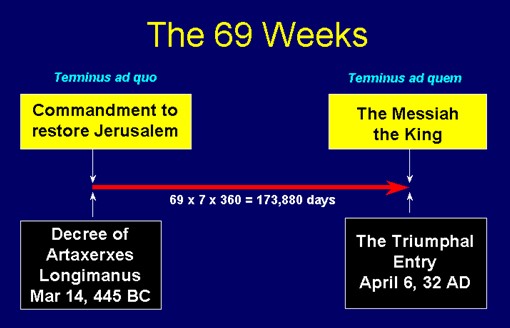 This is undoubtedly one of the most amazing prophecies in the entire Bible, and absolute proof that Jesus Christ is the Messiah of Israel, and that the Bible is the infallible Word of a God who is outside time and therefore able to declare the end from the beginning.
This is undoubtedly one of the most amazing prophecies in the entire Bible, and absolute proof that Jesus Christ is the Messiah of Israel, and that the Bible is the infallible Word of a God who is outside time and therefore able to declare the end from the beginning.
What however is sobering, is to realise that Jesus held the Jews accountable to know Daniel’s prophecy; and because they ‘missed it’, Jesus pronounced national blindness on them and then prophesied the destruction of Jerusalem – which occurred in 70AD – all because they ‘knewest not the time of thy visitation’
“And when he was come near, he beheld the city, and wept over it, Saying, If thou hadst known, even thou, at least in this thy day, the things which belong unto thy peace! but now they are hid from thine eyes. For the days shall come upon thee, that thine enemies shall cast a trench about thee, and compass thee round, and keep thee in on every side, And shall lay thee even with the ground, and thy children within thee; and they shall not leave in thee one stone upon another; because thou knewest not the time of thy visitation.” (Luke 19:42-43)
After a siege lasting almost a year, the Roman forces under Titus Vespasian took and destroyed Jerusalem. Titus had wanted to preserve the Temple but in the fighting, a burning torch was thrown through a window of the Temple starting a fire that was so intense that it melted all the gold on the walls inside. Consequently, Titus ordered the Temple to be taken apart stone by stone to recover all the gold. It was reported that over a million Jews died in the siege.
As a result of this, Jews were scattered around the world; their lives literally ‘hung in doubt’ (See Deut 28). This led some to conclude that God had finished with Israel, and that the promises given to Israel would now be fulfilled by the church. However as Paul made clear in Romans 9,10 & 11, God is not through with Israel: “For I would not, brethren, that ye should be ignorant of this mystery, lest ye should be wise in your own conceits; that blindness in part is happened to Israel, until the fullness of the Gentiles be come in.” (Rom 11:25)
The same message was given by the church at Jerusalem in Acts 15. It had become clear that gentiles were to be included in God’s plan of salvation, but the question was then asked: ‘what about Israel?’ We read: “And after they had held their peace, James answered, saying, Men and brethren, hearken unto me: Simeon hath declared how God at the first did visit the Gentiles, to take out of them a people for his name. And to this agree the words of the prophets; as it is written, After this I will return, and will build again the tabernacle of David, which is fallen down; and I will build again the ruins thereof, and I will set it up” (Acts 15:13-16)
Throughout the Old Testament there are countless prophecies regarding Israel’s ultimate restoration; indeed as we will see, the 70th week of Daniel’s prophecy has yet to be fulfilled, and as the whole of the prophecy was concerning ‘thy people and thy holy city’, Israel and Jerusalem still have a major part to play in God’s overall plan.
Daniel 9:26 – The Interval
And after threescore and two weeks shall Messiah be cut off, but not for himself: and the people of the prince that shall come shall destroy the city and the sanctuary; and the end thereof shall be with a flood, and unto the end of the war desolations are determined.
With the 69 weeks now dealt with, we find two specific events in this verse that will occur after the 69 weeks, but before the 70th. Firstly the ‘cutting off’ of the Messiah, but not for Himself; and then the destruction of Jerusalem by a people from whom another price is said to come.
As we know, less than a week after Jesus rode into Jerusalem completing the 69 weeks, He was crucified – but not for Himself: “And he is the propitiation for our sins: and not for ours only, but also for the sins of the whole world.” (1 John 2:2) And then, just as Jesus had foretold, 38 years later, Jerusalem was destroyed by the Romans.
What this should immediately make us realise is that there is an interval between the 69th and 70th week of this prophecy.
Some ‘scholars’ have objected to placing a gap between the 69th and 70th week, but as is clear from the text, the 70th week could not begin until after the Messiah had been cut of and Jerusalem had been destroyed by the Romans. Therefore, from what we know of history, this interval had to have lasted at least 38 years; however we find that it has now lasted almost two thousand years.
It is clear from the next verse that the event that will trigger the 70th week is the confirming of a covenant with Israel for the last ‘week’ (seven years) of this prophecy. One simple way of knowing that this ‘week’ has not yet (nor could have) occurred is that for any covenant to be signed with Israel, Israel have to exist as a nation, and yet from AD70 right up until May 14th 1948, Israel were not a nation, nor in their land. Thus if one stops and thinks about what this implies, we will see that this prophecy demands that all the prophecies about a future restoration and regathering of the Nation of Israel, after God has scattered them among all the nations of the earth, have to be taken literally. There is no way that this can be made to apply to the church. Two clear and unambiguous prophecies that underline this are found in Deuteronomy as follows:
Scattering
“If thou wilt not observe to do all the words of this law that are written in this book….
…the LORD will rejoice over you to destroy you, and to bring you to nought; and ye shall be plucked from off the land whither thou goest to possess it. And the LORD shall scatter thee among all people, from the one end of the earth even unto the other; and there thou shalt serve other gods, which neither thou nor thy fathers have known, even wood and stone. And among these nations shalt thou find no ease, neither shall the sole of thy foot have rest: but the LORD shall give thee there a trembling heart, and failing of eyes, and sorrow of mind: And thy life shall hang in doubt before thee; and thou shalt fear day and night, and shalt have none assurance of thy life” (Deut 28:58, 63-66)
Regathering
“And it shall come to pass, when all these things are come upon thee, the blessing and the curse, which I have set before thee, and thou shalt call them to mind among all the nations, whither the LORD thy God hath driven thee, And shalt return unto the LORD thy God, and shalt obey his voice according to all that I command thee this day, thou and thy children, with all thine heart, and with all thy soul; That then the LORD thy God will turn thy captivity, and have compassion upon thee, and will return and gather thee from all the nations, whither the LORD thy God hath scattered thee. If any of thine be driven out unto the outmost parts of heaven, from thence will the LORD thy God gather thee, and from thence will he fetch thee: And the LORD thy God will bring thee into the land which thy fathers possessed, and thou shalt possess it; and he will do thee good, and multiply thee above thy fathers.” (Deut 30:1-5)
Some critics would try and say that the prophecies regarding the regathering refer to the regathering of the Jews to the land of Israel after the Babylonian captivity; however Deuteronomy 28:36-58 clearly deals with the Assyrian and Babylonian captivity, whereas verses 63-66 warn of a far greater scattering ‘from the one end of the earth even unto the other’ and consistent with this, the regathering prophesied above is from ‘all the nations, whither the LORD thy God hath scattered thee’.
Another prophecy that confirms this is found in Isaiah 11:11-12 “And it shall come to pass in that day, that the Lord shall set his hand again the second time to recover the remnant of his people, which shall be left, from Assyria, and from Egypt, and from Pathros, and from Cush, and from Elam, and from Shinar, and from Hamath, and from the islands of the sea. And he shall set up an ensign for the nations, and shall assemble the outcasts of Israel, and gather together the dispersed of Judah from the four corners of the earth.”
From the context, this 2nd regathering of the Jews from around the world will occur at the time of the Second Coming when “He [Jesus] shall send his angels with a great sound of a trumpet, and they shall gather together his elect from the four winds, from one end of heaven to the other.” (Matt 24:31) In this verse from Matthew, Jesus was actually quoting from Isaiah 27: “And it shall come to pass in that day, that the great trumpet shall be blown, and they shall come which were ready to perish in the land of Assyria, and the outcasts in the land of Egypt, and shall worship the LORD in the holy mount at Jerusalem.” (Isa 27:13)
If this is the second regathering from around the world, when did the first regathering take place? Answer: In 1948, when, just as Isaiah prophesied (Isaiah 66:8) a nation was born in a day, and countless Jews returned home for the first time since AD70.
Thus (getting back on track!), the 70th week could not have occurred until 1948 when Israel were back in the land that God had given them.
It is worth noting that this is not the only time this ‘gap’ appears in scripture. There are in fact 24 occasions where we jump from the time of Christ to the Tribulation, omitting what has become know as the ‘church-age’. One of the obvious reasons for this is that the church was a mystery hidden in the Old Testament (cf Matt 13 / Eph 3:1-12). One of the other examples of this ‘gap’ is found in Luke 4:17-21
“And there was delivered unto him [Jesus} the book of the prophet Isaiah. And when he had opened the book, he found the place where it was written, The Spirit of the Lord is upon me, because he hath anointed me to preach the gospel to the poor; he hath sent me to heal the brokenhearted, to preach deliverance to the captives, and recovering of sight to the blind, to set at liberty them that are bruised, To preach the acceptable year of the Lord. And he closed the book, and he gave it again to the minister, and sat down. And the eyes of all them that were in the synagogue were fastened on him. And he began to say unto them, This day is this scripture fulfilled in your ears.”
Why were all eyes fastened upon Him? Because Jesus stopped mid-way through a sentence. The Jews would have been familiar with this prophecy from Isaiah, but when Jesus reads it to them, rather than complete the verse, He simply stops. When we compare this to Isaiah’s prophecy, found in Isaiah 61, we discover the following: “The Spirit of the Lord GOD is upon me; because the LORD hath anointed me to preach good tidings unto the meek; he hath sent me to bind up the brokenhearted, to proclaim liberty to the captives, and the opening of the prison to them that are bound; To proclaim the acceptable year of the LORD, and the day of vengeance of our God; to comfort all that mourn” (Isa 61:1-2)
Why did Jesus stop at the comer? Because, just as Jesus said, the first part of the prophecy was indeed being fulfilled in their ears; Jesus had come to preach good tidings, heal the brokenhearted, preach deliverance etc. but between this time and the day of vengeance of our God there has been a period of almost two thousand years. Thus, just as with our prophecy in Daniel, the last part will not be fulfilled until after the church-age.
Daniel 9:27 – The 70th Week
And he shall confirm the covenant with many for one week: and in the midst of the week he shall cause the sacrifice and the oblation to cease, and for the overspreading of abominations he shall make it desolate, even until the consummation, and that determined shall be poured upon the desolate.
In the last verse we were introduced to ‘the prince that shall come’ (a.k.a. Antichrist). There we were told that he will be of the people that destroyed the city (of Jerusalem). From history we know that these ‘people’ were the Romans; therefore this prince who is to come must also be ‘of the Romans’, or from the Roman Empire. It is important to realise that the Roman Empire was divided into two legs (remember the stature in Daniel 2); the western leg is what we are most familiar with from our history lessons, but the eastern leg that covered Turkey, Assyria, Iraq etc survived the western leg by about a thousand years. The reason this is of importance is that one of the other titles of the ‘prince who shall come’ is the ‘Assyrian’. (Is 10:24 / Is 14:24 / Mic 5:5-6), suggesting a strong link with the eastern part of the Roman Empire. Many Bible commentators have made the assumption that the final world empire that will be ruled by Antichrist, will come from the European Union / EEC etc. Whilst this may be the case, we should not ignore the possibility that it could be much broader than this, and there are those who see the 10 horns/ 10 toes / 10 kings, who will make up Antichrist’s government, as ten regions of the world, not just Europe.
As we noted in the last verse, the ‘prince that shall come’ will confirm a covenant for one ‘shabuwa’ – a week of years. This will be the 70th and final week of the prophecy that Gabriel gave Daniel. We have already seen that all seventy weeks were concerning the Jews and Jerusalem, so it is no surprise that this covenant is centred on the Jews. This is confirmed by the fact that in the middle of the week (i.e. after three and a half years) the ‘prince who shall come’ will cause the sacrifice and oblation to cease. It is of course the Jews that will be doing the sacrificing as commanded in the Law of Moses. Who the ‘many’ are is a matter of scholastic debate; some feel it is the ‘many’ Jews who will by now be living in Israel; others feel that it will be the surrounding Arab nations, and thus this will be some sort of peace treaty. Whatever the situation, the result will be that Israel will be granted permission to start sacrificing once again. However in order for this to happen, the Jewish Temple will have to be rebuilt again. It is no secret that that the Temple Institute in Jerusalem are already planning for such a time. They have for some years now been making the tools required for the ceremonies as well as the priest’s clothing as required in the Law of Moses. It is apparently possible for the Temple to be rebuild on the Temple Mount alongside the Dome of The Rock . Whether this will be the case, or whether the Done of the Rock will be destroyed by an earthquake or act of war remains to be seen; but the Jewish Temple will be rebuilt one way or another.
A menorah, already made and ready for use in the rebuilt temple.
The Temple Mount in Jerusalem
In an act modelling that which was done by Antiochus Epiphanies (cf Daniel 8), this ‘prince who shall come’ (a.k.a. Antichrist) will stop the Jewish Sacrifices and, according to Revelation 13, erect an idol (image of himself) in the holy of holies. This will be an abomination to God, and will thus mark the beginning of the Great Tribulation (last three and a half years of the seven) as spoken of by Jesus: “When ye therefore shall see the abomination of desolation, spoken of by Daniel the prophet, stand in the holy place, (whoso readeth, let him understand:) Then let them which be in Judaea flee into the mountains: Let him which is on the housetop not come down to take any thing out of his house: Neither let him which is in the field return back to take his clothes. And woe unto them that are with child, and to them that give suck in those days! But pray ye that your flight be not in the winter, neither on the sabbath day: For then shall be great tribulation, such as was not since the beginning of the world to this time, no, nor ever shall be. And except those days should be shortened, there should no flesh be saved: but for the elect’s sake those days shall be shortened.” (Matt 24:15-22)
In these few verses, Jesus points to Daniel chapter 9 as the key to understand these things (all of this chapter in Matthew was in response to the disciples asking Jesus ‘when will these things be and what will be the sign of your coming?’). Jesus also makes it clear that this abomination will stand in the holy place. Furthermore, it is clear that Jesus’ warning is not to the church or Christians, but to Jews living in Judea, who will still be under the law and therefore will not be able to travel far if this event occurs on a Sabbath day; not will it be easy for them to escape if it occurs in the winter because many of the roads become impassable.
From Revelation 12 we find out that, at this point, Israel will flee into the wilderness (Bozrah or Petra) for the last three and a half years of the ‘week’. This will be a terrible time for the Jews as prophesied by many of the Old Testament Prophets:
“Ask ye now, and see whether a man doth travail with child? wherefore do I see every man with his hands on his loins, as a woman in travail, and all faces are turned into paleness? Alas! for that day is great, so that none is like it: it is even the time of Jacob’s trouble; but he shall be saved out of it.” (Jer 30:6-7)
“Awake, O sword, against my shepherd, and against the man that is my fellow, saith the LORD of hosts: smite the shepherd, and the sheep shall be scattered: and I will turn mine hand upon the little ones. And it shall come to pass, that in all the land, saith the LORD, two parts therein shall be cut off and die; but the third shall be left therein. And I will bring the third part through the fire, and will refine them as silver is refined, and will try them as gold is tried: they shall call on my name, and I will hear them: I will say, It is my people: and they shall say, The LORD is my God.” (Zech 13:7-9)
In the Nazi Holocaust, one in every three Jews were killed. In the Great Tribulation two out of every three Jews will be killed. Why does God allow this? Firstly to punish Israel for their iniquity; and secondly to cause them to repent and seek their Messiah. In Hosea we read: “I will go and return to my place, till they acknowledge their offence, and seek my face: in their affliction they will seek me early.” (Hos 5:15) This is an incredible prophecy! God is speaking and says ‘I will go and return to my place’. In order to return to His place, He must of left it! Q. So when did God leave His place?
- When He came to earth as a baby and lived and died to pay for the sins of the whole world.
Thus it will be during this time of immense persecution that Israel will repent and realise that Jesus is their Messiah: “And I will pour upon the house of David, and upon the inhabitants of Jerusalem, the spirit of grace and of supplications: and they shall look upon me whom they have pierced, and they shall mourn for him, as one mourneth for his only son, and shall be in bitterness for him, as one that is in bitterness for his firstborn.” (Zech 12:10)
At the end of this period Jesus will return to fight for His people against the armies of ‘the prince who shall come’ (read Zechariah 14), and will consume him with the brightness of His coming (2 Thes 2:8), thus bringing to an end the 70 weeks and bringing in everlasting righteousness.
Finally, not only will God reign in the kingdoms of man, Jesus Christ will rule over them!
Daniel 9:24-27 Overview
24 “Seventy weeks [490 years] are determined upon thy people and upon thy holy city, to finish the transgression, and to make an end of sins, and to make reconciliation for iniquity, and to bring in everlasting righteousness, and to seal up the vision and prophecy, and to anoint the most Holy.
25 Know therefore and understand, that from the going forth of the commandment to restore and to build Jerusalem unto the Messiah the Prince shall be seven weeks, and threescore and two weeks: the street shall be built again, and the wall, even in troublous times.
26 And after threescore and two weeks shall Messiah be cut off, but not for himself: and the people of the prince that shall come shall destroy the city and the sanctuary; and the end thereof shall be with a flood, and unto the end of the war desolations are determined.
27 And he shall confirm the covenant with many for one week: and in the midst of the week he shall cause the sacrifice and the oblation to cease, and for the overspreading of abominations he shall make it desolate, even until the consummation, and that determined shall be poured upon the desolate.
May you be blessed and encouraged by this study.



